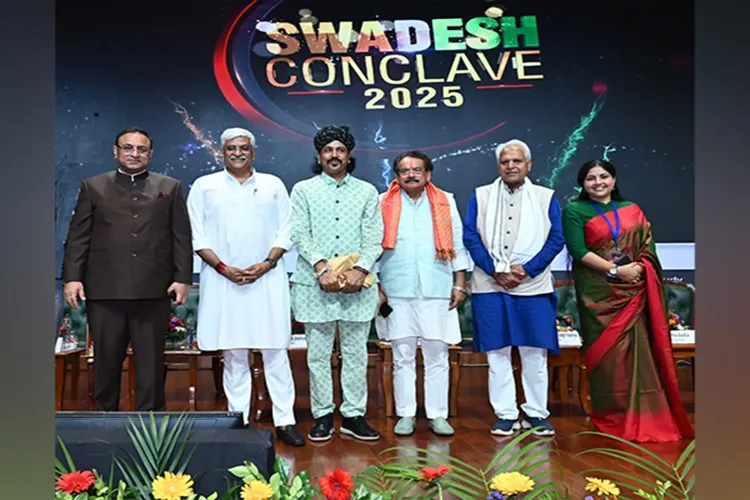
New Delhi
Artificial Intelligence (AI) will play a pivotal role in transforming India into a developed nation by 2047, leaders, jurists and technocrats said at the Swadesh Conclave 2025 held at Bharat Mandapam on 3rd September, 2025. Organised under the theme "Transforming Bharat", the conclave highlighted the convergence of AI, indigenous innovation and inclusive policy as a catalyst for economic growth, social equity and global leadership. Speakers also raised concerns about the ethical and regulatory implications of unchecked technological expansion.
India enters semiconductor era
Minister of State for Electronics and IT Jitin Prasada announced India’s foray into semiconductor manufacturing with the launch of a made-in-India chip. “The age of oil is over—this is the era of the semiconductor chip,” he said, adding that the government has created a ₹10,000 crore fund to promote and regulate AI technologies.
Union Minister Gajendra Singh Shekhawat called upon citizens to embrace a Swadeshi spirit in adopting AI, saying, “India is now known not just as the land of Gandhi, but also the land of Modi.”
Call for regulatory balance
Supreme Court judge Justice N Kotiswar Singh cautioned against the use of AI in judicial decision-making. “AI cannot understand emotion, character, or context. Using it to judge people is risky and ethically problematic,” he said.
Senior advocate Pradeep Rai noted that AI should serve as an aid rather than a replacement in professions like law, medicine and journalism. He also advocated for integrating AI literacy in education to ensure responsible use among youth.
Technology to drive equitable growth
Economist and former JNU professor Arun Kumar said India needs to sustain 8.5% annual GDP growth and raise per capita income from USD 2,700 to USD 14,000 to achieve developed nation status by 2047. “Equity and inclusion must drive the use of technology,” he added.
Physicist and econophysicist Prof Anirban Chakrabarti of JNU spoke about using AI and machine learning to predict agricultural price volatility and support small farmers in making data-driven decisions. He noted that regulators like RBI and SEBI are already deploying AI to monitor markets and manage risks.
Swadesh Samman Awards and cultural highlights
The conclave also featured the Swadesh Samman Awards, which were presented to former ISRO chairman Dr S Somanath, social activist Azim Alam and musicians Prahlad Singh Tipania and Mame Khan, who also performed at the event.
Minister of State for Animal Husbandry and Panchayati Raj S P Singh Baghel said India is on track to become one of the world’s top three economies, building on its historical strengths.
BJP MP Manoj Tiwari urged youth to remain engaged in politics, stating, “Honest effort and patience can take you far—don’t give up on public service.”
KSFE Managing Director S K Sanil underlined the role of microfinance in poverty alleviation, citing the Grameen Bank model pioneered by Nobel laureate Mohammad Yunus.
OTBL Chairperson (Retd.) Sushma Rawat said AI and technology can be powerful tools for national transformation if channelled responsibly and encouraged youth to “stay curious and keep learning.”
Opening the event, Balaji Foundation Chairperson Rajshri Rai said Swadesh aims to create space for inclusive dialogue. “Everyone must have the space to speak—true transformation begins with listening,” she said, quoting poet Faiz Ahmed Faiz.
READ MORE: Balen Shah, the rising star of Nepal's politics
Since its inception in 2020, Swadesh Conclave has become a key platform for discourse on technology, governance and India’s cultural identity, with AI taking centre stage in its vision for 2047
